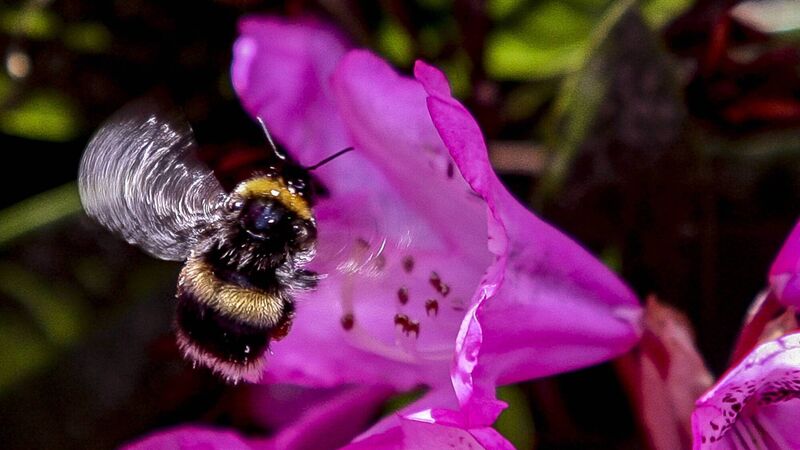Irish Examiner view: Let's join forces to save our bees

One third of our 98 wild bee species is in trouble, with some close to extinction. Picture: Garry O'Neill
The Covid pandemic hasn’t generated too many shafts of sunlight, but one positive has been our reconnection to nature.
Confined to our homes or 5km for much of the past year, and less distracted by the constant din of hectic lifestyles, many of us have begun to listen again to the wonderful sounds of nature.
In his book, , Steven Lovatt maintains that the forced decline in human activity has allowed the “Earth to hear itself think, and the voice of its thought was birdsong”.
Millions of us, he said, are not just hearing but “actively actively listening, perhaps for the first time, to the songs of birds — ancient songs, perhaps unchanged from the stone age”.
We’ve also become a lot more proactive, with pet stores and specialist shops struggling to keep up with the demand for bird food, feeders, and birdhouses, with many gardens and window boxes again a welcome pitstop for our feathered friends.
However, while our interests have been peaked of late, the refocus on the outdoors has done little to halt the alarming decline in bird and pollinator populations.
As Niall Hatch of Birdwatch Ireland wrote in these pages some weeks ago, “birds are key indicators of environmental health, and changes to their distributions and populations reflect changes in habitats, food chains and wider biodiversity”.
He put the blame firmly at the feet of successive governments who he claims have ignored “biodiversity for decades”.
The impact is noticeable in the gardens and outdoor spaces that have become our new playgrounds. One third of our 98 wild bee species is in trouble, with some close to extinction. Native Irish plants are in decline. Insect populations are also falling.
However, all is not lost and, if the pandemic has shown us anything, it's that lots of small actions taken together can make a big difference.
Today the , in conjunction with the National Biodiversity Data Centre, has published a booklet to mark World Bee Day.
As well as raising awareness about the importance of pollinators, it’s full of hints and tips on how we can protect them and help them thrive once again.
It includes simple steps you can take in the garden to provide food and shelter — not just in spring and summer, but all year round.
However, it’s not just individuals and families. Farmers, communities, city and county councils, sports clubs, and organisations, and small and large businesses also have a role to play. Encouragingly, many are already doing their bit.
The success of the National Biodiversity Centre’s all-Ireland pollinator plan over the past five years has slowed the decline and shown what can be done when we all come together.
It has also provided a template for other countries to follow, with many turning to Ireland for help.
As Dr Una Fitzpatrick of the National Biodiversity Centre says, the beauty of the plan is that “we’re not asking anybody to solve this problem; we’re asking everyone to get involved and, if everybody took small actions, then together we can solve it”.
So for the day that’s in it, it's time to get busy.





